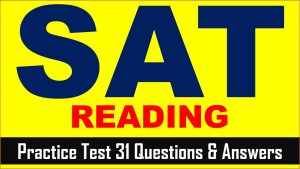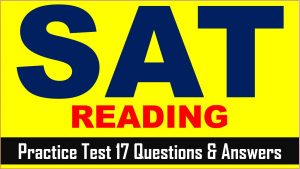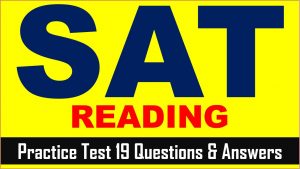Hi SAT Aspirants, welcome to AKVTutorials. As you know SAT (Scholastic Assessment Test) is a standard test, used for taking admission to undergraduate programs of universities or colleges of United States. SAT is developed and published by the College Board, an organization in United States, administered by the Educational Testing Service. Are you searching for SAT Reading Practice Questions? Then, in this article of AKVTutorials, you will get SAT Reading Practice Test 72 | SAT 2024 Online Tutor AMBiPi
SAT Reading Practice Passage
SAT Reading Practice Test Comprehensive Passage
This passage is adapted from George Orwell’s writings that were first published in England on 17 August 1945. The following 13 multiple choice questions are based on this passage below.
| That evening loud laughter and bursts of singing came from | |
| the farmhouse. And suddenly, at the sound of the mingled | |
| voices, the animals were stricken with curiosity. What could be | |
| Line happening in there, now that for the first time animals and | |
| Line 5 | human beings were meeting on terms of equality? With one |
| accord they began to creep as quietly as possible into the | |
| farmhouse garden. | |
| At the gate they paused, half frightened to go on but Clover led | |
| the way in. They tiptoed up to the house, and such animals | |
| Line 10 | as were tall enough peered in at the dining-room window. |
| There, round the long table, sat half a dozen farmers and half a | |
| dozen of the more eminent pigs, Napoleon himself occupying | |
| the seat of honour at the head of the table. The pigs | |
| appeared completely at ease in their chairs. The company | |
| Line 15 | had been enjoying a game of cards but had broken off for the |
| moment, evidently in order to drink a toast. A large jug was | |
| circulating, and the mugs were being refilled with beer. No one | |
| noticed the wondering faces of the animals that gazed in at the | |
| window. | |
| Line 20 | Mr. Pilkington, of Foxwood, had stood up, his mug in his |
| hand. In a moment, he said, he would ask the present | |
| company to drink a toast. But before doing so, there were a | |
| few words that he felt it incumbent upon him to say. | |
| It was a source of great satisfaction to him, he said –and, he | |
| Line 25 | was sure, to all others present – to feel that a long period of |
| mistrust and misunderstanding had now come to an end. | |
| There had been a time – not that he, or any of the present | |
| company, had shared such sentiments –but there had been a | |
| time when the respected proprietors of Animal Farm had | |
| Line 30 | been regarded, he would not say with hostility, but perhaps |
| with a certain measure of misgiving, by their human | |
| neighbours. Unfortunate incidents had occurred, mistaken | |
| ideas had been current. It had been felt that the existence of a | |
| farm owned and operated by pigs was somehow abnormal and | |
| Line 35 | was liable to have an unsettling effect in the neighborhood. |
| Too many farmers had assumed, without due enquiry, that on | |
| such a farm a spirit of license and indiscipline would prevail. | |
| They had been nervous about the effects upon their own | |
| animals, or even upon their human employees. But all such | |
| Line 40 | doubts were now dispelled. Today he and his friends had |
| visited Animal Farm and inspected every inch of it with their | |
| own eyes, and what did they find? Not only the most | |
| up-to-date methods, but a discipline and an orderliness which | |
| should be an example to all farmers everywhere. He believed | |
| Line 45 | that he was right in saying that the lower animals on Animal |
| Farm did more work and received less food than | |
| any animals in the county. Indeed, he and his | |
| today had observed many features which they | |
| intended to introduce on their own farms immediately. | |
| Line 50 | He would end his remarks, he said, by emphasizing once |
| again the friendly feelings that subsisted, and ought to | |
| subsist, between Animal Farm and its neighbors. Between | |
| pigs and human beings there was not, and there need not be, | |
| any clash of interests whatever. Their struggles and their | |
| Line 55 | difficulties were one. Was not the labour problem the same |
| everywhere? Here it became apparent that Mr. Pilkington | |
| was about to spring some carefully prepared witticism on | |
| the company, but for a moment he was too overcome by | |
| amusement to be able to utter it. After much choking, | |
| Line 60 | during which his various chins turned purple, he managed |
| to get it out: “If you have your lower animals to contend | |
| with,” he said, “we have our lower classes!” This BON | |
| MOT set the table in a roar; and Mr. Pilkington once again | |
| congratulated the pigs on the low rations, the long working | |
| Line 65 | hours, and the general absence of pampering which he had observed on Animal Farm. |
| And now, he said finally, he would ask the company to rise to | |
| their feet and make certain that their glasses were full | |
| “Gentlemen,” concluded Mr. Pilkington, “gentlemen, I give | |
| you a toast: To the prosperity of Animal Farm!” There | |
| Line 70 | was enthusiastic cheering and stamping of feet. Napoleon |
| was so gratified that he left his place and came round the | |
| table to clink his mug against Mr. Pilkington’s before emptying | |
| it. When the cheering had died down, | |
| Napoleon, who had remained on his feet, intimated that he | |
| Line75 | too had a few words to say. |
SAT Reading Comprehension Practice Test Questions
SAT Reading Practice Test Question No 1
The main purpose of the passage is to
Option A : mock a seemingly harmonious scene.
Option B : emphasize the value of mutual respects.
Option C : highlight the importance of cooperation.
Option D : stress the significance of staying neutral.
SAT Practice Test Answer No 1
Show/Hide Answer
Option A : mock a seemingly harmonious scene.
SAT Reading Practice Test Question No 2
It can be inferred from the entire passage that Napoleon and Mr. Pilkington
Option A : shared many of the political thoughts and ideals.
Option B : had the similarly elevated social status in their groups.
Option C : toasted to the same revered concept worth of celebration.
Option D : exchanged thoroughly on important social issues.
SAT Practice Test Answer No 2
Show/Hide Answer
Option B : had the similarly elevated social status in their groups.
SAT Reading Practice Test Question No 3
Based on the information provided, the passage is accounted
Option A : from an angle of participant of the party.
Option B : from several different characters of the farm.
Option C : from a keen observer who knows the farm well.
Option D : from a collaborator in the human farmer side.
SAT Practice Test Answer No 3
Show/Hide Answer
Option C : from a keen observer who knows the farm well.
SAT Reading Practice Test Question No 4
It can be reasonably inferred from the initial reaction of animals to the raucous noises in the house that
Option A : the farmhouse garden is too obvious to be ignored.
Option B : such a party between men and animal can’t be can’t be justified.
Option C : humans and animals have never met so intimately before.
Option D : their approaching to the garden is planned well ahead.
SAT Practice Test Answer No 4
Show/Hide Answer
Option C : humans and animals have never met so intimately before.
SAT Reading Practice Test Question No 5
As used in line 23, the word “incumbent” most correctly means
Option A : presumed.
Option B : obligated.
Option C : liable.
Option D : commanded.
SAT Practice Test Answer No 5
Show/Hide Answer
Option B : obligated.
SAT Reading Practice Test Question No 6
In line 29, the author suggests that neighboring human farmers views the “respected proprietors” with animosity because
Option A : the nearby farms operated and managed solely by humans would be unduly influenced by the Farm.
Option B : the concept of animal-run farms cannot be a realistic and common practice in human society.
Option C : the lower working animals are bound to feel discontent and rebel against the upper ones.
Option D : the human neighbors should quickly conclude the matter regarding the peaceful living with the farm.
SAT Practice Test Answer No 6
Show/Hide Answer
Option A : the nearby farms operated and managed solely by humans would be unduly influenced by the Farm.
SAT Reading Practice Test Question No 7
Which choice provides the best evidence for the answer to the previous question?
Option A : Lines 38-42 (“They…find?”)
Option B : Lines 42-47 (“Not…county”)
Option C : Lines 50-52 (“He… neighbors”)
Option D : Lines 56-62 (“Here…classes!”)
SAT Practice Test Answer No 7
Show/Hide Answer
Option A : Lines 38-42 (“They…find?”)
SAT Reading Practice Test Question No 8
Which choice can be reasonably inferred from the human farmers’ assumption in lines 36-37?
Option A : Heads of the animal farm are best appointed directly by the human neighbors or committee.
Option B : Human inquiries through proper channels must be in place to ensure the farm’s prosperity.
Option C : Without human intervention, the animal farm would result in total confusion and chaos.
Option D : Few of the animals has the ability to guide their actions on a noble and amicable track.
SAT Practice Test Answer No 8
Show/Hide Answer
Option C : Without human intervention, the animal farm would result in total confusion and chaos.
SAT Reading Practice Test Question No 9
The word “license” in line 37 most closely means
Option A : disturbance.
Option B : indulgence.
Option C : extravagance.
Option D : chaos.
SAT Practice Test Answer No 9
Show/Hide Answer
Option B : indulgence.
SAT Reading Practice Test Question No 10
Why did Mr. Pilkington mention there shall not be any clash of interests between pigs and humans in lines 52-54?
Option A : They belong to different species.
Option B : They employ the same labor strategy.
Option C : They must tackle on the same challenges.
Option D : They both desire for the farm prosperity.
SAT Practice Test Answer No 10
Show/Hide Answer
Option C : They must tackle on the same challenges.
SAT Reading Practice Test Question No 11
Which choice provides the best evidence for the answer to the previous question?
Option A : Lines 50-54 (“He…whatever”)
Option B : Lines 54-59 (“Their…it”)
Option C : Lines 67-69 (“And…Farm!”)
Option D : Lines 70-75 (“Napoleon…say”)
SAT Practice Test Answer No 11
Show/Hide Answer
Option B : Lines 54-59 (“Their…it”)
SAT Reading Practice Test Question No 12
According to the information provided, the passage is best viewed as
Option A : a scene in a stage play that humiliates certain groups.
Option B : an except from a novel intended as a political satire.
Option C : a portion of a long tirade that targets the ruling class.
Option D : a part of a diary kept as a record of a social experiment.
SAT Practice Test Answer No 12
Show/Hide Answer
Option B : an except from a novel intended as a political
satire.
SAT Reading Practice Test Question No 13
As used in line 62, the word “BON MOT” most closely means
Option A : Proper Phrase.
Option B : technical term.
Option C : Special jargon.
Option D : witty remarks.
SAT Practice Test Answer No 13
Show/Hide Answer
Option D : witty remarks.



